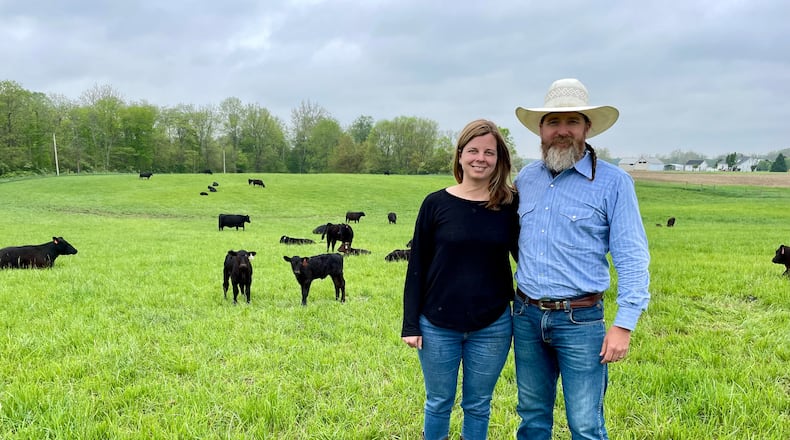Credit: Natalie Jones
Credit: Natalie Jones
Generational farming
The couple, who have been married for almost 10 years, were inspired by Grimes’ family history in the farming industry. Her late-father had started grain farming in the 1980s after owning the John Deere Dealership in Urbana and his father had raised Angus and Hereford cattle on the same property. Grimes said her great-grandmother was the one that started the family in the farming industry in the 1930s — raising everything from hogs and sheep to various crops.
Grimes originally went to college in Florida to study business, but returned home and started studying agricultural business at The Ohio State University. At this time, she was working on the grain farm with her dad.
Frantz did not come from a farming family, but said he had wanted to be a farmer since high school. He recalled working at a dairy farm milking cows his junior and senior years and falling in love with the personalities of the animals. With some guidance from a professor at Wilmington College, he graduated with a degree in agronomy. He was working for an agriculture retail supplier where he met Grimes because her dad was one of his customers.
Credit: Natalie Jones
Credit: Natalie Jones
The start of Honey Creek Beef
There were two unique instances that sparked the start of Honey Creek Beef.
The couple recalled going to a farming conference in Minnesota where one of the speakers “suggested that as grain farmers we should be looking for alternative markets to sell our grain on a more regular basis,” Frantz said.
This was at a time when grain prices were fairly low, Grimes added. One of the suggestions was to deliver grain to a cattle, chicken or hog farm and they thought why not take it to their own livestock operation.
They also recalled eating dinner at Seasons Bistro and Grille, previously located at 28 S. Limestone St. in Springfield, and talking with co-owner Doug McGregor about where he sourced the restaurant’s beef from. Frantz said McGregor was using a corporate distributor because he was having a hard time getting the same quality and consistency locally.
“And that just kind of lit a fire under Adam,” Grimes said.
Seasons Bistro and Grille became their first customer.
It’s all about genetics
The couple is raising American Black Angus cattle due to their genetics.
“Angus genetics have given us a set of cows and bulls that basically take care of themselves as long as they have good grass and fresh water,” Frantz said. “The American Angus Association has done a lot of genetic research to help create a modern cow that produces healthy calves and eventually high quality steaks.”
Credit: Submitted Photo
Credit: Submitted Photo
Frantz is breeding for cows with a maternal characteristic — meaning they are good mothers to their calves and don’t need assistance. He’s looking at their carcass traits for marbling and the size of the ribeye loin. He said the way cows’ bodies develop is genetic. He also makes sure the cows on his farm are docile to protect those that work at their farm like farmhands Jacob Green and Katie Turner.
Feed is grown on the same farm
All cows at Honey Creek Beef are fed grass that is grown at the farm.
“Nutritional cool season grasses have the best nutrition for cattle,” Frantz said.
Their cows are fed a mix of orchard grass, perennial ryegrass, Kentucky bluegrass and Timothy grass. They also use Triticale, a hybrid grass with a high nutritional value, in the winter months when grasses don’t grow very well. When they feed the cows Triticale, they also mix in haylage or corn silage based on what an animal nutritionist recommends.
Credit: Natalie Jones
Credit: Natalie Jones
“We don’t use any unnecessary medications on this farm,” Frantz said. “We don’t use any feed additives that are medications or anything like that and we don’t use any hormone injections. We think the genetics itself has all the right balance of what that animal needs.”
Soil health and conservation are also extremely important at Honey Creek Beef.
“We make decisions that have lasting impacts on the soil and we are constantly thinking of ways to make it better,” Frantz said.
Cow comfort and care
Another important part of Honey Creek Beef is cow comfort and care. They want their cows to naturally exist without constant influence from humans to alleviant any stress.
“Their comfort, ability to choose their own feed, and an all natural pasture environment, contribute heavily to the quality of the meat and are critical to the success of the farm,” Frantz said.
If a cow is stressed, then the quality of its beef decreases. This could result in tougher and less marbled meat, Frantz said.
To create a less stress or no stress environment, Honey Creek Beef uses horses and horsemanship. Frantz said the cows are less stressed when their team is riding horseback through the pasture, rather than driving an ATV or pick-up truck.
Growing the herd from scratch
Honey Creek Beef started off with two heifers (female cows that haven’t given birth). They ended up breeding one and then buying three female calves from partner rancher Wesley Lambert, who has became a huge influence in helping Frantz grow his herd from scratch.
“A lot of beef farmers they will buy calves just to feed out (and then sell the beef). All of our calves are born here,” Grimes said.
The couple breeds every cow on the farm to calve every 11 months. They have two bulls that are rotated. With the bulls, they make sure bloodlines do not overlap and that their characteristics are a good match for their average cow.
When a cow has a bull, Honey Creek Beef castrates the bull at six months and separates it from the mom. The bull is fed on a separate pasture and lives until about one year old. Their goal is to raise the bulls naturally to 1,200 pounds before they are harvested. Frantz said the average age a steer is harvested in the U.S. is 18 to 24 months. Honey Creek Beef is able to harvest younger steers — resulting in more tender and higher quality beef.
All steers are taken to Caven’s Meats, an Ohio Department of Agriculture inspected facility located in Fletcher right outside of Piqua.
“It’s an important part of this process too for us to make sure it’s done with the same quality and care standards that animal has experienced for its entire life,” Frantz said.
Honey Creek Beef harvests one steer a week — resulting in 500 pounds of processed, package beef products like steaks, ground beef, roast, hamburger patties or bratwurst, Frantz said.
Where to find Honey Creek Beef
Honey Creek Beef can be found at the Springfield Farmers Market, Harmony Farm Market & Gifts in Springfield, Gill’s Quality Meat Market in Springfield, Charlo’s Provisions & Eatery in Springfield, Haren’s Market in Troy and Current Cuisine in Yellow Springs.
Credit: Natalie Jones
Credit: Natalie Jones
The cattle farm is also open from 11 a.m. to 2 p.m. every Sunday for customers to buy meat and see where their meat is coming from. If you’ve never had Honey Creek Beef, the couple recommends trying their burgers, ribeyes, New York strips or chuck roasts.
Honey Creek Beef also works with several chefs with restaurants and food trucks in the Dayton and Springfield area including CULTURE in Dayton, Little Fish Brewing Company in Dayton, Seasons Kitchen in Springfield, Sushi Hikari Moe in Springfield, Fully Cooked Sushi in Springfield and Yellow Springs Baking Company in Yellow Springs.
The couple said working with local chefs is one of the best parts because it’s amazing to see what they are able to create using their beef.
“Chefs were where we wanted to go because raising this beef is an art for us,” Frantz said. “Cowboying is an art. The chef world is an art.”
Future of Honey Creek Beef
Honey Creek Beef wants to continue growing their business in a sustainable and organic way in 2024. They hope to reach more customers and get more people on the farm to help make the connection of where their food is coming from.
They also plan to start a second pasture near their main farm location.
“I’m proud of being able to say when I was a little kid this is what I wanted to do and we’re actually doing it,” Frantz said.
Honey Creek Beef is named after the creek located across the street from the farm. For more information or to order beef, visit honeycreekbeef.com or the farm’s Facebook or Instagram pages (@honeycreekbeef).
REACH OUT
Natalie Jones writes about where our food comes from and dining in Dayton and the Southwest Ohio region. If you would like your business to be considered for this feature, email natalie.jones@coxinc.com or find her on TikTok @natalie_reports and Instagram @natalie_reports937.
About the Author






